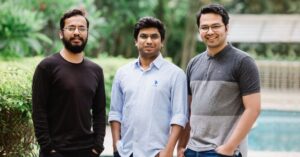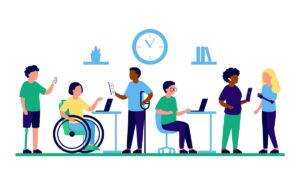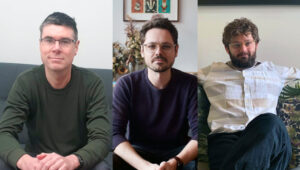As India grappled with two waves of COVID-19, the country turned into a melting pot of emotions ranging from distress to despondence. As ambulance sirens punctuated the air, desperate requests for help began flooding social media pages and WhatsApp groups for blood, oxygen, and beds.
While the period has been tremendously challenging for everyone, a few remarkable stories of humanity, selflessness and ingenuity emerged to spark hope.
The following five Intel employees went above and beyond the call of duty in the battle against the coronavirus pandemic. These aren’t billion-dollar projects, but tales of humanity and innovation that created maximum impact.
Navesh Priyankar helped organise a rural COVID-19 relief campaign
The vulnerability of the health sector, especially in rural India, combined with the scale of the pandemic left the system reeling under unprecedented stress. That led Navesh Priyankar, a graphics hardware engineer at Intel India and an alumnus of IIT Kanpur, to do something for the community.
He noticed a huge gap in the healthcare system in rural and semi-urban areas and the acute shortage of basic medicines, equipment, and manpower to fight the pandemic in the hinterlands. Navesh, together with his IIT Kanpur batchmates, launched a COVID-19 relief campaign called ‘Together We Strive – Aid for Rural India’ in association with the Children of India Foundation. It helped supply medical kits, medical equipment and oxygen concentrators to rural areas in India during the second wave of the pandemic.
“We are now in the last phase of our fundraising. Next, our focus is on augmenting the rural health infrastructure and supporting relief efforts for a potential third wave and beyond, in collaboration with different organisations,” says Navesh.
With personal and public contributions, the initiative has successfully raised around Rs 50 lakh in just a few months. This has enabled the distribution of five oxygen concentrators, more than 30,000 medical kits, hundreds of PPE kits, oximeters and thermometers in 25 districts across 10 states in India, in collaboration with district administrations and NGOs on the ground.
Mashrin Srivastava created a chatbot for critical COVID-19 leads
Mashrin, a deep learning engineer at Intel India, lost many family members and friends due to COVID-19 in the past year – the dearest loss being his grandfather.
During the second wave of COVID-19, requests for help were pouring in across social media platforms. Mashrin’s knowledge of search queries made him leverage technology to help his close circle find relevant resources online during an emergency.
He worked to build a search platform that was automated and could be used by everyone. That is how covidsos.live was born.
Mashrin spent around three hours on a weekend creating the first version of the app, and the feedback he received was overwhelming. Within hours, the app was shared across social media platforms and over WhatsApp groups, even before Mashrin had made a public post about the app.
Covidsos.live is a COVID-19 chatbot that uses intelligent keyword searches to dynamically curate validated leads from various platforms like Twitter, for essential resources like ICU/hospital beds, ventilators, oxygen cylinders, concentrators, plasma, medicines, doctor consultations, official helplines, ambulances, meals, and vaccination slots for those in India. It supports English, Hindi and seven other regional Indian languages.
The app is free, works even with low internet connectivity, has no ads, doesn’t require any downloads or signups and ensures no user-related data is captured.
To date, Covidsos.live has helped over 2 million people with essential resource searches. “I was flooded with messages from people on how the app offered timely help to them or other people they knew. I am glad that it managed to help many in need and I really hope that the situation doesn’t get so bad ever again that we need an app like Covidsos,” says Mashrin.
Ankit Navik mentored youth for alternative careers
Life and wellness, of course, weren’t the only losses caused by the pandemic. A recent survey by Lotto247 found that 77 percent of economically active adults in India lost income due to the COVID-19 pandemic.
Ankit Navik, a platform architect at Intel India, decided to help people through mentorship. Ankit used his prior experience as a lecturer along with his strong desire to help others, to contribute to a mentorship initiative by upskilling two youths in his hometown in Gujarat whose incomes were impacted during the pandemic.
Ketan Patel who formerly dealt with mobile accessories, was upskilled in computer and laptop repairing skills. It helped Ketan open a repair store out of a small garage.
Ankit’s second mentee, Vivek Tandel, a fisherman, was trained in online tasks like filling in application forms for licenses, jobs, visas and so on. Starting off with one borrowed laptop, he now runs a moderately successful business that has expanded to four computers.
Deepak N ‘gave back’ to society in innovative ways
Deepak, an analog engineer at Intel India, also knew his expertise was in the mentorship space. Designated as a master volunteer by the Department of Information and Public Relations (DIPR) in Davanagere, Deepak found opportunities in distributing ration kits to needy families, feeding stray animals, and creating awareness about COVID-19 guidelines.
During the pandemic, Deepak felt he could also enable people to learn new languages from the comfort of their homes through an initiative called ‘Kannada Gothide’ which imparts free Kannada language classes online, via WhatsApp. So far, the initiative has helped over 2,000 people.
His other initiative, ‘Pusthakavani’, involves converting various learning materials into MP3 audio books to help people with vision impairment prepare for competitive exams. He also leads a volunteer team that teaches music, dance, crafts, life skills, and more to children in an orphanage.
Deepak carries out other volunteer works which include extending financial help to orphanages and people with disabilities, and creating awareness about environmental pollution through his initiative Pratyarpana which means ‘giving back’ in Sanskrit.
“People want to be productive. We just provide them a platform at the right time,” he says.
Lakshmi Karthik became a COVID-19 warrior for Bengaluru
When the nation-wide lockdown was announced last year, Bruhat Bengaluru Mahanagara Palike (BBMP), the Bengaluru civic agency, called for volunteers or ‘corona warriors’ to help them in each ward.
A few noble individuals volunteered their time and effort to extend care and support to people under home quarantine during the lockdown. Lakshmi Karthik, an administrative assistant with Intel India, was one such volunteer for Ward 178 in JP Nagar, Bengaluru. She single-handedly managed the ward which comprised around 1,500 houses. She would visit designated homes in the area to monitor quarantined people, recent travellers for intensive contact tracing, house-to-house surveillance and other clinical interventions, as required, while also supplying medicines and essential items to the quarantined individuals.
Often going beyond the demands of her role, she helped build a network of sources across Bengaluru to provide essential information about the availability of hospital beds, ambulances, oxygen cylinders and food and medical supplies.
Lakshmi, who braved the alarming coronavirus situation by stepping out of the home to help people in need, says she is happy that she could help a larger family out there.










